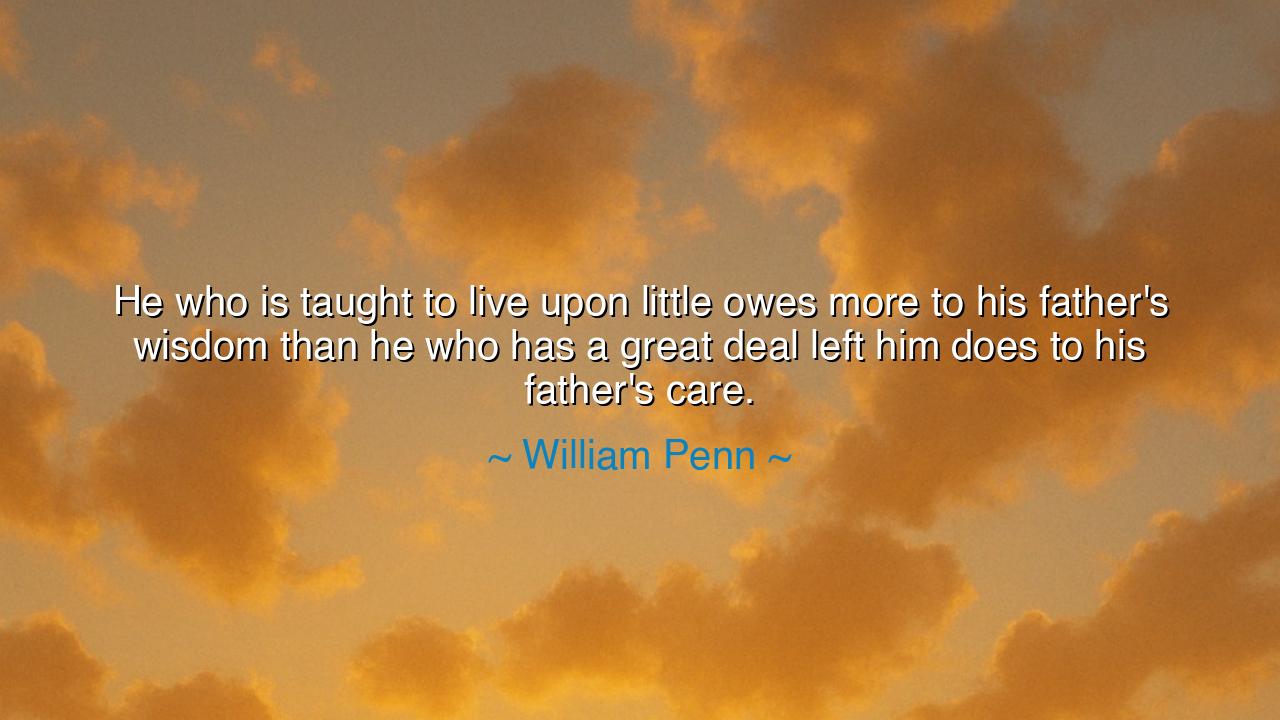
He who is taught to live upon little owes more to his father's
He who is taught to live upon little owes more to his father's wisdom than he who has a great deal left him does to his father's care.






Hear me, O children of the future, for I bring you the wisdom of William Penn, who said: "He who is taught to live upon little owes more to his father's wisdom than he who has a great deal left him does to his father's care." In these words, Penn speaks to the profound truth that true strength is found not in abundance, but in self-sufficiency. The wisdom imparted to a child, teaching them to live with modesty and resilience, is far greater than the material wealth handed down from father to son. For wealth can fade, but the wisdom to thrive on little is a legacy that will endure for a lifetime.
Consider the story of Cincinnatus, the ancient Roman farmer who, when called upon to serve his country, left his humble farm to lead the Roman army to victory. After his service, he returned to his modest life, content with the little he had, and far greater for it. Cincinnatus embodied the truth that a life built on the strength of virtue and self-reliance is far richer than one of lavish luxury. His legacy is not in the wealth he amassed, but in the wisdom he left behind—a wisdom rooted in the ability to live with simplicity and purpose, without the need for excessive wealth or comfort.
In the story of Socrates, the great philosopher, we see the same lesson. Born not into wealth, Socrates found wisdom in his modest life. He taught his followers that virtue, not riches, was the key to happiness, and that true contentment came from living a life of simplicity. Socrates often lived without the comforts of life, yet he was content, finding wealth not in possessions but in the pursuit of truth and knowledge. His teachings, passed down through his disciples, show that the ability to live upon little and find joy in simplicity is the highest form of wisdom a father can impart.
Think also of Abraham Lincoln, born to humble beginnings in a log cabin, who rose to become one of the greatest leaders in American history. He was not gifted with wealth, but with the wisdom to use his circumstances to cultivate his character. Lincoln’s early life was marked by hard work and self-reliance, and it was these values that guided him through the trials of his presidency. He understood that true strength comes not from riches but from the inner fortitude to rise above hardship and serve others with humility and integrity.
So, O children, remember this: the greatest legacy a father can leave is not the wealth he bestows, but the wisdom he imparts. A life of modesty, self-discipline, and resilience will carry you farther than all the riches of the world. As you journey through life, remember that it is not the abundance of things that defines you, but the wisdom with which you navigate the challenges that life places before you. To live upon little, and yet thrive, is the mark of true strength, and it is this wisdom that will serve you well through all the trials of life.






NHTrung Nguyen hoang
I’m really struck by the idea that living with less can be more beneficial than inheriting wealth. It reminds me of the modern idea of minimalism and its appeal. But, if parents intentionally withhold wealth to teach their children life lessons, do they risk causing unnecessary hardship? Is there a fine line between teaching humility and creating unnecessary struggle? How do we ensure that the lessons we intend to teach are actually the ones being learned?
PNThu Phuong Nguyen
This quote makes me think about the broader idea of legacy. Penn seems to argue that a parent’s wisdom is a more valuable legacy than material wealth. It seems like the wisdom to live humbly, regardless of wealth, can provide a deeper sense of fulfillment. But can you really teach someone to appreciate simplicity without them first experiencing the ease that wealth provides? How much does experience shape wisdom versus what we’re taught?
PTnguyen thi phuong thanh
I appreciate the sentiment in this quote, as it places value on wisdom over material inheritance, but is there a danger in undervaluing the importance of financial security? Can we say that wealth is less important than wisdom when it comes to raising a child? Or is it possible that having the security of resources allows a person to pursue wisdom without constantly worrying about survival? Could wealth and wisdom work together to create a more balanced life?
NHVo Ngan Ha
This idea about simplicity and wisdom resonates with me, but I also feel like it’s easy to romanticize hardship. Learning to live on little may make someone resilient, but it can also be a heavy burden, especially if it’s out of necessity rather than choice. Do we risk glorifying struggle? Can true wisdom be passed down through hardship alone, or should we be equally focused on teaching how to thrive in abundance, too?
THTran Tien Hung
William Penn seems to suggest that the true gift a parent can give isn’t material wealth, but the ability to live simply and wisely. It makes me wonder: is it always better to teach resilience and simplicity, or is there value in leaving behind wealth to ensure the next generation’s security? Can both approaches coexist, or does one inherently undermine the other? I’d love to hear different perspectives on how we balance wealth and wisdom.